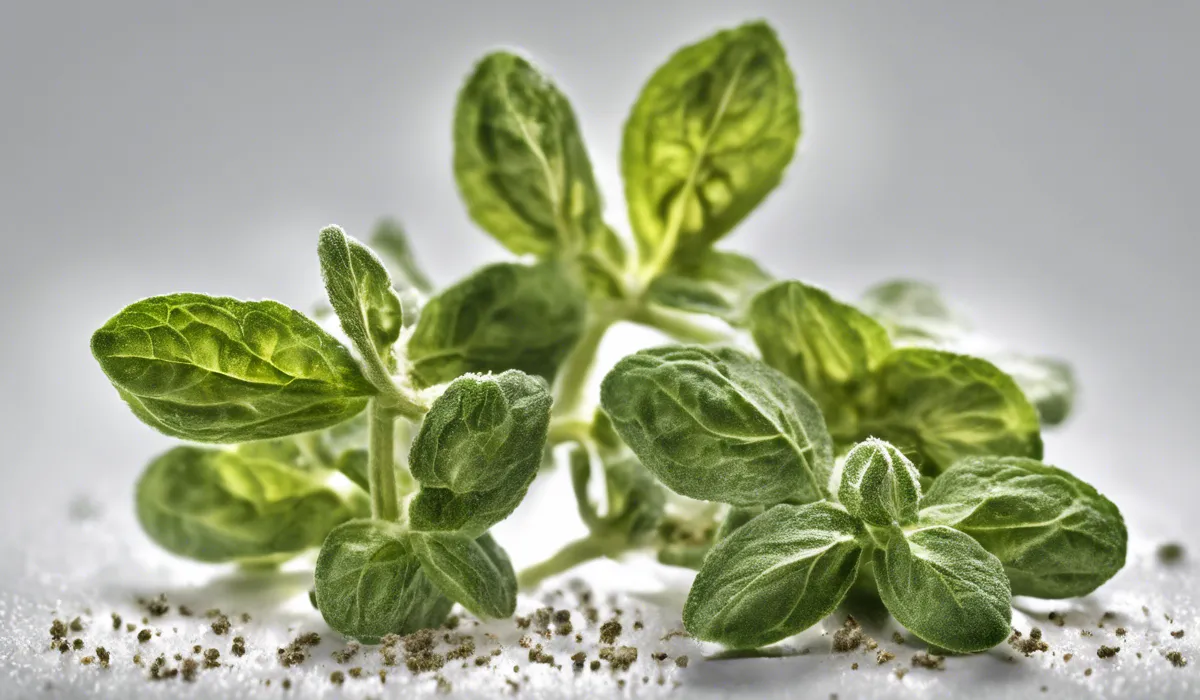Oil of oregano contains carvacrol, a compound with antimicrobial properties that may help fight certain fungal infections. However, there’s limited scientific evidence to support its efficacy in killing mold or fungal infections inside the body. Consult a healthcare provider for mold-related health issues.
Oil of Oregano and Its Properties

Definition of Oil of Oregano
Oil of oregano is an essential oil derived from the leaves and flowers of the oregano plant, which is a member of the mint family.
This oil is known for its strong aroma and powerful components that contribute to its health benefits.
Active Compounds
The primary active compounds in oil of oregano are carvacrol and thymol. Carvacrol is recognized for its antimicrobial properties, which can assist in the fight against certain pathogens.
Thymol serves as a protective agent with its antiseptic abilities, contributing to the oil’s overall efficacy.
Antimicrobial, Antifungal, and Antibacterial Attributes
Oil of oregano boasts a wide range of antimicrobial properties, making it effective against a variety of microorganisms.
Its antifungal and antibacterial capabilities have placed it as a popular alternative remedy for various health concerns.
Historical Use in Traditional Medicine
Historically, oil of oregano has been used in traditional medicine practices around the world.
It has been utilized to treat respiratory issues, gastrointestinal problems, and even to provide relief from skin conditions.
The Concept of Mold in the Body

Explanation of Fungal Infections in Humans (Mycoses)
Fungal infections, or mycoses, occur when invasive fungi take over areas of the body and are too much for the immune system to handle.
These can range from superficial infections like athlete’s foot to more serious systemic infections that affect internal organs.
Common Types of Fungal Infections
Fungal infections can manifest in various forms such as ringworm, yeast infections, and nail fungus. Each type affects different parts of the body and can have varying levels of severity.
Difference Between External and Systemic Mold Issues
External mold issues often affect the skin or nails, while systemic infections enter the bloodstream, which can lead to widespread issues throughout the body.
Understanding this difference is crucial in addressing the appropriate treatment options.
Body’s Immune Response to Fungal Infections
The body’s immune system typically works to fend off fungal invaders. However, when the immune system is compromised or the fungi are particularly aggressive, an infection can take hold and require medical intervention.
Efficacy of Oil of Oregano Against Internal Mold Issues

Scientific Studies on Oil of Oregano’s Antifungal Properties
Research has indicated that oil of oregano may be effective against certain fungi due to its carvacrol content.
However, scientific evidence is still limited regarding its use for internal fungal infections, and further studies are required to substantiate these claims.
How Oil of Oregano May Affect Different Types of Fungi?
Different fungi respond to treatments in various ways, and oil of oregano has shown potential in inhibiting the growth of some common fungi.
Nonetheless, its effectiveness can vary, and each situation requires a tailored approach.
Possible Internal Applications and Safety Concerns
While oil of oregano is considered safe when used appropriately, there are potential risks and side effects, especially with internal use.
It is essential to consult a healthcare provider to discuss these concerns and appropriate applications.
Comparison with Conventional Antifungal Treatments
Conventional antifungal treatments have been extensively studied and are often the first line of defense against fungal infections.
Oil of oregano might be considered as a complementary approach, but it should not replace proven medical treatments.
Expert Recommendations and Dosage Considerations
Healthcare professionals can provide guidance on the usage of oil of oregano, including potential benefits, dosage, and interaction with other medications.
Always follow expert advice to ensure safe and effective use.
FAQs About Oil of Oregano and Mold
Can oil of oregano kill mold infections inside the body?
There is limited scientific evidence to support the use of oil of oregano to kill mold infections inside the body, and it is not a recognized treatment by healthcare professionals.
Is carvacrol in oil of oregano effective against internal fungal infections?
Carvacrol has antimicrobial properties that may help fight certain fungal infections, but its efficacy against internal fungal infections lacks substantial scientific support.
Should I use oil of oregano to treat mold-related health issues?
It is important to consult a healthcare provider for mold-related health issues rather than self-treating with oil of oregano.
What are the proven benefits of oil of oregano regarding mold and fungi?
Oil of oregano contains compounds with antimicrobial properties, but there’s limited proven benefits regarding its use against mold and fungi inside the body.
Are there any risks in using oil of oregano for internal mold issues?
Using oil of oregano without medical supervision could lead to potential risks, including interactions with other medications and side effects. Always consult with a healthcare provider first.
Final Thoughts
While oil of oregano’s carvacrol has antimicrobial properties that might combat some fungal infections, its effectiveness against internal mold infections lacks substantial scientific backing.
It’s crucial to seek professional medical advice for internal mold health concerns rather than relying on unproven remedies.
